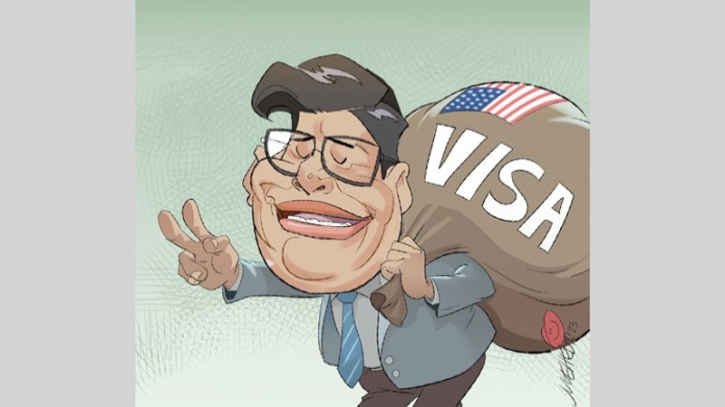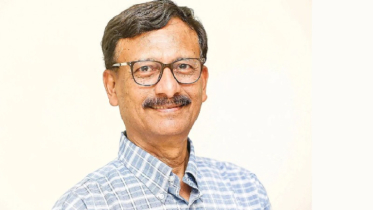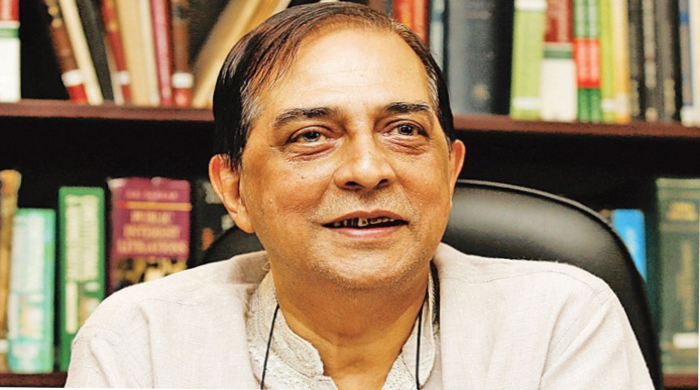
US Visa
I have traveled to a number of cities in the USA. In almost all of them, I met Bangladeshi professionals and students, many of whom adopted the country as their permanent home. They have gained greater financial security in the USA than in Bangladesh and have been helping their kith and kin back home make ends meet. Many of them also help their family members immigrate to the USA and thus maintain the flow of immigration. To them the USA is an important country that is credited for enhancing their livelihood and well-being.
Given the positive impact of the USA on so many Bangladeshis, it sounds bewildering when we read in the news that recently problems have crept in between Bangladesh and the USA. Sometimes it is also reported in the media that the government in Dhaka seeks intervention of a third country to resolve its issues with the USA. But we the citizens are not very sure about the nature and extent of the ‘imbroglio’ that needs to be untangled in order for us to maintain smooth diplomatic relations with the United States.
I am not a foreign relations expert. Nor do I have specialist knowledge to comment on what has been going on between the governments of Bangladesh and the USA. But as a citizen of Bangladesh, I read Bangladeshi newspapers and other media outlets to know what is happening in and to my beloved country. It is in that capacity that I express my views about the recent developments in Bangladesh-US relations.
The theory of strained Bangladesh-US relations has been accentuated since the USA made it public that it would impose visa sanctions on Bangladeshi officials of certain categories and departments if they were found obstructing democratic processes or rigging elections. In a May 24, 2023 statement it said:
‘The Secretary [of State] has just announced a new visa policy under Section 212(a)(3)(C) – known as “3C” – of the Immigration and Nationality Act to support Bangladesh’s goal of holding free, fair, and peaceful national elections. Under this policy, the United States will be able to restrict the issuance of visas for any Bangladeshi individual believed to be responsible for, or complicit in, undermining the democratic election process in Bangladesh. This includes current and former Bangladeshi officials, members of pro-government and opposition political parties, and members of law enforcement, the judiciary, and security services.’
On September 24, 2023, US ambassador to Dhaka Peter Haas disclosed that besides ‘members of political parties, law enforcement, and former and current government officials, the US visa policy will soon include members of the media.’
It is sad, and to some extent a national embarrassment, that a foreign country has deemed it necessary to take measures to help ensure free and fair elections in our country. But it will be remiss of fair-minded commentators to deny that, through its undemocratic behaviour, the current Bangladesh government actually emboldened the USA to take such measures. Losing democratic credibility and public confidence, the Bangladesh government has furnished the USA with reasons (or excuses) to impose sanctions on Bangladeshis who are perpetrators of, or complicit in, undemocratic practices.
The truth of the matter is that free and fair elections have been sent into exile from our country. Those in power in Bangladesh seem to have ticked all the boxes of gross undemocratic practices. The last two general elections of 2014 and 2018 in the country were anything but free, fair, and competitive. Eventually, the absence of free and fair elections translates into oppression and sufferings of the people. Irrespective of US sanctions (or lack thereof) on the perpetrators of election fraud, these issues are well worth our attention and must be addressed.
In my opinion, our problem is not that a foreign country will not give visas to those who are involved in vote rigging, election fraud or manipulation of the results. What must bother us all is the absence of human and democratic rights in our country and the consequent suffering of our fellow citizens.
People in Bangladesh have been facing widespread political persecution in the form of forced disappearances, systematic abuse of power and misuse of the legal system. Despite that, many of them have been struggling to restore democratic rule and accountability and to regain their voting rights. This is a mammoth task, and often they find it overwhelming to face the juggernaut of the undemocratic regime. In doing so, many lives have been lost; innumerable freedom- and democracy-loving people have been languishing in prisons; thousands have fled the country; and many people have lost the means of livelihood as they are subject to a flood of unfounded and politically motivated lawsuits. It has become a full-time job for many political leaders and activists to appear at different law courts in different parts of the country on a regular basis.
Most Bangladeshis love democracy and want to get back their voting rights. Elections in Bangladesh are not only political events, they are also festivals and sources of entertainment for the people. Whether or not there are any US sanctions, isn’t it important for those in power that they restore democracy and give people their voting rights back?
For the sake of fairness and transparency, all of us — irrespective of our political leanings and biases — must agree that (nocturnal) vote rigging, ballot stuffing, voter intimidation, and similar practices are corrupt and corrupting. If we agree that these are violations of democratic norms and of basic human rights, we should not take umbrage with US visa sanctions which are targeted on individuals found guilty of undemocratic acts.
We have little control over what the USA will do or will not do concerning its relations with Bangladesh’s government or people. But we can fix our own household before we take umbrage with the behaviour of external actors. We do not need warnings from others to establish people’s democratic rights in our country. If we can protect human rights and democratic principles and re-establish our democratic institutions and legal systems, we as a nation will be honoured by the outside world. What is more, that will restore our unity and will enable us to face external challenges together.
Lastly, we must treat vote rigging and election fraud as law and order issues. Tens of thousands of peacekeepers from Bangladesh have participated in UN missions in dozens of foreign countries. They help those countries maintain peace and law and order situation, and their actions in those places are not (and should not be) interpreted as foreign interference.
It is the right of every country to grant or deny visas to citizens of other countries. Similarly, the USA has the prerogative to prevent people found guilty of violating human rights and democratic principles from entering its territories. It will be unfair to construe such a US stance as foreign interference.
The fact of the matter is that, people of Bangladesh have no problems with the threats of US visa sanctions because it is targeted against election cheats, not against all Bangladeshis. Perhaps, the perpetrators of vote rigging and other undemocratic practices in Bangladesh and those who support them want us to regard this particular US action as a problem.
[Dr Md Mahmudul Hasan is professor of English and postcolonial literature at International Islamic University Malaysia. He edits Asiatic: IIUM Journal of English Language and Literature.]


























